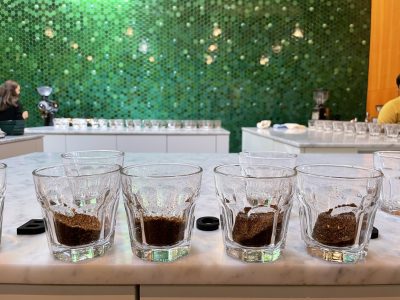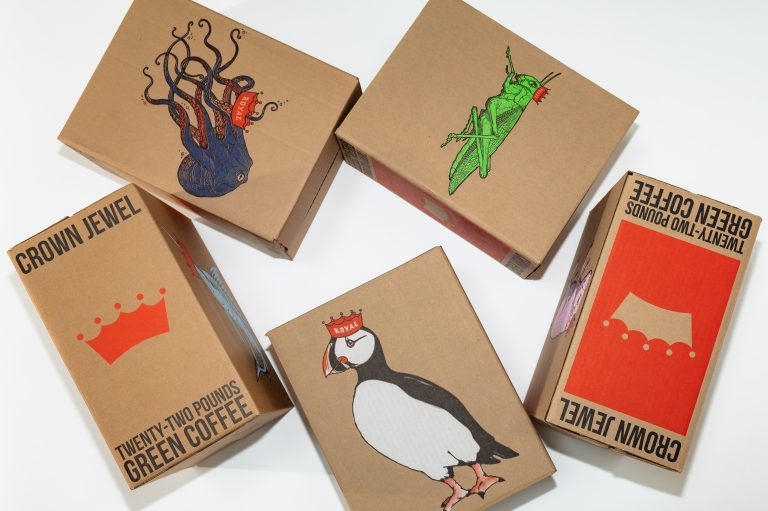Good Food Awards Coffee Entry
The Good Food Awards entry period is about to start! The Good Food Awards is open to producers in 17 categories, including coffee. The deadline to enter is June 30th. Want to learn more? Listen to the Good Food Awards co-founder Sarah Weiner, co-chair Tovara Salley, and co-chair Sandra Loofbourow discuss the awards and how to enter on The Crown Podcast.
In order to be eligible for a Good Food Award, coffee entries must meet the following standards:
- Roasted in the USA or US territories.
- Traceable back to the producer (or producers) at the farm or cooperative level.
- Sourced in such a way that price premiums meet or exceed Fair Trade minimums relative to the world commodity price, either through direct trade or through publicly stated policies and in-place processes.*
- Sourced from farms or cooperatives where:
- There is an emphasis on pursuing sustainable agricultural practices including water conservation and minimizing or eliminating the use of synthetic inputs.**
- Transparent, documented practices ensure fair and humane work standards for all laborers. **
- Made by a roaster that:
- Prioritizes waste management through water conservation, composting, and recycling.
- Regularly checks roasting air quality. Roasters should be maintaining and cleaning their stacks regularly, and making sure their afterburner (where applicable and dependent on the volume of roasting annually) is keeping temperatures high enough to incinerate particulates.
- Promotes a safe and enjoyable work environment by implementing policies and programs such as wage transparency, offering development and learning opportunities to staff, and sponsoring or participating in social or environmental projects.***
- Made by a crafter that is an upstanding member of the good food community, committed to equity, inclusion, and justice in all levels of their business.
*Prices determined based on C market (min $1.40) plus Fair trade (+ $.20) and Organic ($.30) pricing.
**These commitments can be shown by being the third party certified to meet the standards of the following certification programs: NOP Organic, SMBC Shade Grown, Fair Trade (FTUSA/Fairtrade International), Rainforest Alliance or by providing further details regarding the farm, estate, associations or cooperatives in which you source from.
***Such as 1% for the Planet, B Corp, GMO-Free Project, Fair Trade, or other local organizations focused on environmental and social responsibility.
To accommodate remote tastings, judging will happen in two phases this year.
Round 1:
- Multiple Bay Area judges taste each coffee.
- Coffees are brewed at home on personal brew devices
- Scoring is out of 30 points, with 5 points possible for each category: Fragrance/Aroma, Flavor/Aftertaste, Acidity, Body, Balance, and Overall Impressions.
- The top 6 coffees from each region move on to round two
- Sign up here
In the first round of judging, members of our local Bay Area community will sign up to participate in our pre-selection process. Folks interested in judging will signup through the Good Food Awards website and pay a nominal fee.
Each judge will receive 5 anonymized coffee samples to brew at home. To help judges prepare for their tasting, we ask that they view the following videos on Brew Variables, Why Grind Matters, and best practices for Infusion and Immersion brewing. Although these brewing guides and recipes are provided, there are no specific guidelines for preparation. Judges are encouraged to brew coffees as they would normally at home.
Judges will submit scores and tasting notes through the Good Food Awards website by Friday, September 25th. The scoresheet will be very simple, with judges evaluating Fragrance/aroma, Flavor/Aftertaste, Acidity, Body, Balance, and Overall Impressions, assigning a score out of 5 points for each category for a final score of 30 points possible.
This round is open to the public, meaning that although we will be targeting coffee professionals in the Bay Area to participate as judges, people from adjacent industries like food, cocktails, and wine, as well as Good Food Guild members and even coffee hobbyists and consumers are welcome to join. To account for the lack of calibration, we will ensure that multiple judges taste each coffee sample.
Round 2:
- Multiple qualified judges taste each coffee
- Coffees are evaluated through cupping, with protocols in place for water, grind size, and water to coffee ratio
- Using the Roasters Guild Roast Evaluation form to select 3 winners from each region
In the second round of judges, we will enlist qualified coffee professionals with experience in cupping and coffee analysis to evaluate the top 6 coffees from each region. Each judge will be given a list of supplies to acquire in advance of the tasting to ensure that they are following SCA cupping protocols, including water recipe, grind size, vessel size and type, and coffee to water ratio. These judges will receive anonymized coffees in the mail prior to the tasting day. On Saturday, October 17th, judging pods will taste together in remote Zoom sessions, and deliberate immediately after tasting. As in previous years, we will use the Roasters Guild Roast Evaluation form. Each coffee will be tasted by multiple judges. Of the 6 high scorers from each region, 3 will become winners.
Interested in being a Round 2 Judge?
Send Sandra (GFA Co-Chair & Tasting Room Director) an email with your contact information to indicate you’re interest! sandra@royalcoffee.com
The Good Food Awards will reach out to folks directly in July with information on how to sign up and what is required for them. For now, we only need a contact email for those who are interested.
Judges will need to have the following on hand:
- 10 identical vessels for cupping, preferably of tempered glass or ceramic material. Ideally, these vessels will be between 7 and 9 fluid ounces (207 ml to 266 ml), with a top diameter of between 3 and 3.5 inches (76 – 89 mm). All cups used shall be of identical volume, dimensions and material of manufacture.
- 5 vessels for spoon rinsing (these do not have to be uniform)
- A reliable way to heat at least 3L/0.8 gallons (or enough to fill your 10 vessels + 5 rinse cups)
- 2 cupping (or soup) spoons
- Thermometer or PiD kettle that can heat water to 200°F ± 2°F (92.2 – 94.4°C) when poured over the grounds
- At least 1.5 gallons of distilled water per round, or enough water to fill 20 cups per round
- One reliable burr grinder
- A scale, preferably one with measurements to the 0.1g
- A timer
- A smartphone or tablet for scoring through cropster
- A separate device for video conferencing
- You may wish to have on hand:
- Palate cleansers of choice – e.g. crackers, banana, jicama, bread
- A spittoon or appropriate receptacle
- An odorless cloth or paper towel for drying spoons and wiping spills
Judges will receive the following from the GFAs:
- Double blind labeled coffee samples
- Third wave water packet
- Grind size sample
Are you interested, qualified, and available? Send an email to sandra@royalcoffee.com


